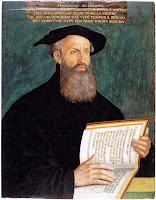John begins his gospel by saying, "In the beginning was the Word, and the Word was with God, and the Word was God." This sets the stage for perhaps the most dramatic truth in human history, as described later in that same chapter in verse 14: "And the Word became flesh and dwelt among us, and we have seen his glory, glory as of the only Son from the Father, full of grace and truth."
John tells us that, amazingly, the Word became flesh...God became a man. In Philippians 2:6-8, Paul says Jesus Christ, the eternal Son of God and the second person of the Deity, "though he was in the form of God, did not count equality with God a thing to be grasped, but made himself nothing, taking the form of a servant, being born in the likeness of men. And being found in human form, he humbled himself by becoming obedient to the point of death, even death on a cross."
What an act of humility for God to submit himself even to death, and the most painful and humiliating form of death at that. But even apart from this, the fact that God even became a human being in the first place is the most supreme act of gracious condescension one can imagine.
When John says he "dwelt among us," the literal language is "he pitched his tent" or "he tabernacled" in our midst. It is an allusion to the fact that before the Temple was built, God's dwelling place in the midst of his people had been in the Tabernacle, essentially a tent-temple that moved with the people. What John is implying here (and says outright in Revelation 21:22) is that the Christ is the true Temple, the place where God and man meet.
When Moses requested to see the glory of God, God's response was, "I will be gracious to whom I will be gracious, and will show mercy on whom I will show mercy. But you cannot see my face, for man shall not see me and live" (Exodus 33:18-20). But so great is the graciousness of God in Christ Jesus that John can truly say, "we have seen his glory, glory as of the only Son from the Father, full of grace and truth."
I am reminded of what may be my favorite lines from any Christmas hymn:
Veiled in flesh the Godhead see;
Hail th'incarnate Deity,
Pleased as man with men to dwell,
Jesus our Emmanuel.
May we, with John, look to Christ and his glory. And may we, with the herald angels sing, "Glory to the newborn king!"
Previous posts in this series:

































